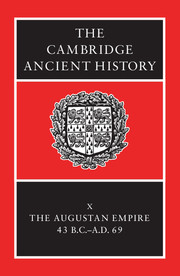18 - Social status and social legislation
from PART IV - ROMAN SOCIETY AND CULTURE UNDER THE JULIO-CLAUDIANS
Published online by Cambridge University Press: 28 March 2008
Summary
The epoch of the destruction of the last great hellenistic monarchy which could challenge Rome in the Mediterranean world and of the addition of a princeps to the Roman constitutional system clarified the superiority of all Roman citizens to all others with whom they lived. Although political liberty was henceforth circumscribed, the privilege of citizens in private law and social status was apparent. Roman law applied only to citizens, but the spread of citizenship, the pervasive presence of a Roman administrative model and the symbiosis of Romans with non-Romans encouraged the imitation of Roman law and social institutions. Nor was Rome immune to influences from outside: the migration of scholars after the conquest of Alexandria, the convenient Jewish idea of the sabbath, innovations in religion or cuisine. Roman social patterns and life must be seen against the mosaic of the empire.
LEGAL DISTINCTIONS
Gaius, writing his textbook on Roman law in the second century A.D., launches into the law of persons with a pithy classification of the human race, as far as it was relevant to Roman law: ‘the primary distinction in the law of persons is this, that all men are either free or slaves. Next, free men are either ingenui (freeborn) or libertini (freedmen). Ingenui are those born free, libertini those manumitted from lawful slavery. Next, of freedmen there are three classes: they are either Roman citizens or Latins or in the category of dediticii.’ (Inst. 1.3.9–12, de Zulueta's translation.) To the mind of a Roman lawyer, legal status is the essential distinction.
- Type
- Chapter
- Information
- The Cambridge Ancient History , pp. 873 - 904Publisher: Cambridge University PressPrint publication year: 1996
References
- 18
- Cited by

